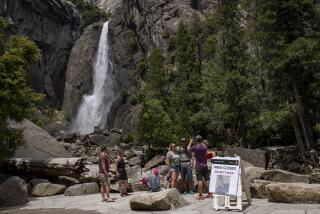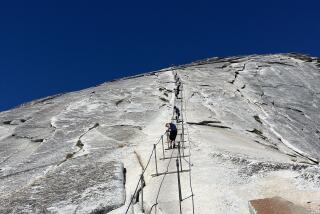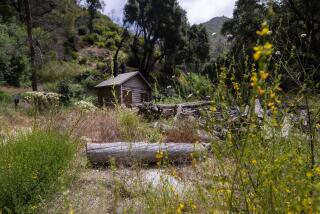Decampers : Washington Budget Crisis Folds Yosemite Tents
YOSEMITE NATIONAL PARK — Scott and Sandy Palmer of Riverside County had excitedly packed up their three kids, the dog, the family bicycles and their camping gear for a long-awaited vacation to this national treasure.
But it didn’t take long for their plans to go haywire.
“We drove in last night after a 12-hour drive that cost $75 in gas and found out we had to turn right back and go home again,” Scott Palmer grumbled Sunday. “Our family vacation is ruined.”
Throughout Yosemite, campers on Sunday traded tales of anger, disappointment and outrage after rangers ordered them to pack up and leave their campsites because of the budget crisis in Washington.
In most of California, the weekend effects from the government shutdown were limited, as some parks managed to stay open through the aid of budget surpluses and other bureaucratic remedies, air traffic controllers remained on full duty, and other federal workers anxiously awaited the start of business Tuesday to find out their own future.
But at Yosemite, the state’s most famous park, the crisis cut deeply and quickly.
With the leaves just beginning to change colors, about 6,000 campers had to take down their tents, roll up their sleeping bags and head out of the park.
The park itself was not closed. In fact, tourists abounded at Camp Curry, the Ahwahnee Hotel, Yosemite Lodge and Yosemite Village, which are all privately run concessions operated by the Yosemite Park & Curry Co. and unaffected by the federal government’s problems.
With prospects for a bipartisan budget agreement uncertain, no one knows when the 12 campgrounds will be reopened or when many park rangers will be able to return to work.
About 300 of 545 permanent National Park Service employees were laid off. All but those in “essential” positions--such as sewer workers, law enforcement officials, medical and emergency workers, and search-and-rescue teams--were out of a job as of 1 p.m. Sunday.
Those grumbling loudest, however, jobless or otherwise, were the park-goers.
Some had waited eight weeks to get a campsite reservation. Others had come from other countries to see some of America’s most famous scenery.
A few had even returned this weekend after having to evacuate during the August fire that ripped through the park, officials said.
But instead of enjoying the Columbus Day weekend as planned, they struggled to find other accommodations and salvage their vacations as park rangers advised them about alternative sites and promised refunds.
Many wondered why officials didn’t wait until the end of the holiday weekend to close the camps, while others complained that they weren’t notified of the closure until Saturday--in some cases just a few hours after entering the park.
Officials explained that they, themselves, only got word from Washington that morning to cut all non-essential services.
For the most part, said park ranger Linda Vinh, 21, who lost her job at 1 p.m., campers were “pretty understanding and cooperative.”
But others gave rangers a tongue-lashing, defying the order to vacate. Some stayed, stubbornly ensconced at their campsites.
“You know you will have to leave,” Fred Elchlepp, ranger in charge of the campgrounds, told one group. “It can be easy or it can be hard. . . . You guys are only being inconvenienced a day or two; some of my employees are losing their jobs.”
The message mollified few.
And campers all had their own stories to tell, each putting a slightly different spin of frustration on the lost weekend.
“We’ve already driven up here and you want us to give up our vacation time,” yelled Arlene Winship of Los Angeles, an administrative assistant for an accounting firm, who drove up Saturday to meet some family members.
“I’m stressed out in a job and I wanted this--this is the most relaxing place in the world,” she told Elchlepp. “Now you’re telling me I have to leave.”
Gloria Norvell, 45, of Santa Barbara spent part of the day leaving notes on the hiking trail for her husband, brother-in-law and her 10-year-old son. They had taken a backpack trip up Half Dome and had arranged to meet back at the campsite--but that was when it was still open. She didn’t know how she was going to meet up with them.
“They’re going to get back bone tired and find out we have to drive back to Santa Barbara tonight,” Norvell said.
Bruce Conger, a 43-year-old bank vice president in Beverly Hills, was more upset for his children than for himself.
“I haven’t been here since I was 14. I was excited to come back with my kids. I’m going to write to my congressman and say that ‘you don’t have any compassion.’ ”
And Steve Johnson of Burlingame wanted to go even further.
Calling the closure “absolutely ridiculous,” Johnson said he visited a lawyer friend at another campsite and asked in some seriousness about the possibility of trying for a temporary restraining order against the government.
The answer: Impossible.
So like thousands of others, Johnson, his wife and three children packed up their things and headed out of Yosemite Valley, grudgingly.
Times staff writer Eric Lichtblau in Los Angeles contributed to this article.
More to Read
Sign up for Essential California
The most important California stories and recommendations in your inbox every morning.
You may occasionally receive promotional content from the Los Angeles Times.










